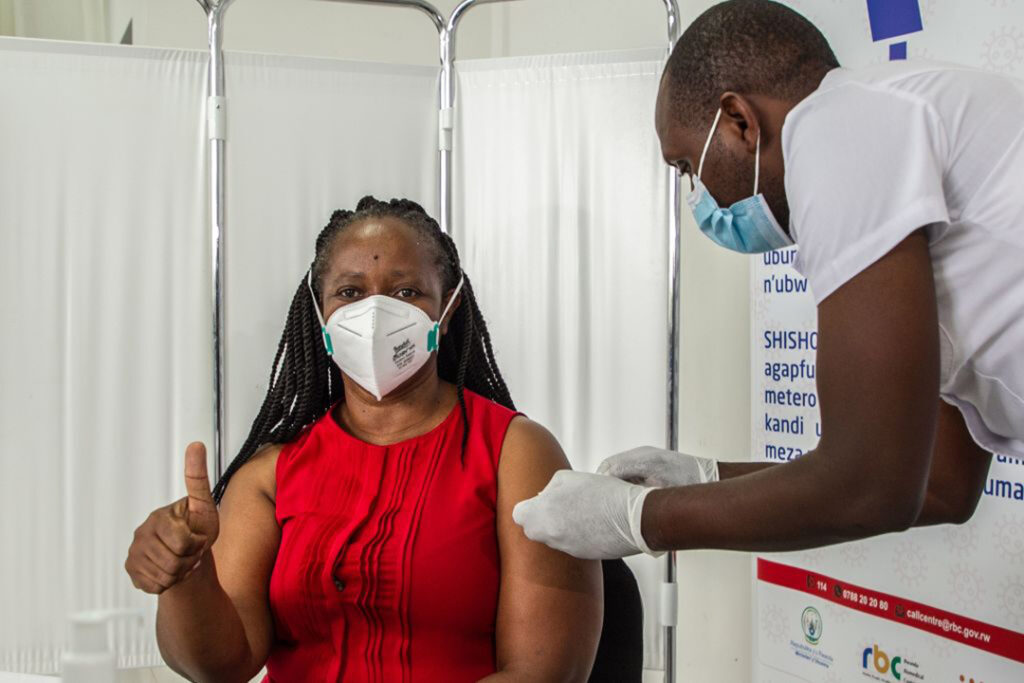ADF STAFF
Rwanda began its COVID-19 vaccination campaign as the first African country to inoculate its people with the Pfizer vaccine, which requires ultra-cold storage.
Health care workers and the elderly were first in line for the shots. The country aims to vaccinate 30% of its 12 million people by the end of the year and 60% of the population by the end of 2022.
Stephanie Nyirankuriza, 90, received her shot at a health facility just east of Kigali.
“This means that I will die when God wants because the coronavirus cannot kill me now,” Nyirankuriza told Reuters.
People waited at health care facilities for 15 minutes after receiving the shot to make sure there were no side effects.
Urusaro Ntoranyi, 70, was eager to receive the vaccine.
“I have children who got COVID-19,” she told Reuters, adding that they survived but two other relatives died.
Besides the Pfizer vaccine produced in the United States, Rwanda also received the AstraZeneca vaccine developed in the United Kingdom. COVAX, the global plan to distribute vaccines equitably, coordinated their delivery.
The country installed special infrastructure to keep the Pfizer shots stored at the required minus 70 degrees Celsius. An official at Rwanda’s Health Ministry told Agence France-Presse the vaccines were “immediately transported to cold room freezers” when they arrived in Kigali.
The U.S. Food and Drug Administration concluded in February that the Pfizer vaccine can still be effective for up to two weeks when transported and stored at conventional pharmaceutical refrigerator temperatures.
Officials distributed the vaccines from the Rwanda Biomedical Center warehouse to district hospitals and then to all 508 health centers across the country, according to a report by the Rwanadan newspaper Taarifa. Helicopters delivered the vaccines to remote areas.
“These doses of COVID-19 vaccine from the COVAX facility represent an unprecedented global effort to have equitable access to COVID-19 vaccines,” Dr. Kasonde Mwinga, World Health Organization Rwanda country representative, told the newspaper.
Dr. Daniel Ngamije, Rwanda’s health minister, said that those who receive the vaccine should continue to observe prevention measures, including wearing masks, physical distancing, avoiding crowds and washing hands. Ngamije also told Taarifa that the government would continue negotiating with international organizations and other governments to acquire additional vaccines.
Rwanda’s approach to the pandemic has earned global praise. With just one doctor for every 10,000 people, Rwanda was the first African nation to impose a lockdown that shut its borders. The country started screening travelers for COVID-19 in January 2020.
In April 2020, a month after the virus was detected in the country, the Rwanda National Police deployed remote-controlled drones to inform Kigali residents about the virus and enforce lockdown measures.
Global shortages of surgical masks and personal protective equipment spurred dozens of Rwandan companies to produce their own. Wilfred Ndifon of the African Institute for Mathematical Sciences in Rwanda developed a fast, effective and inexpensive way to batch-test people for the virus.
Even before Rwanda confirmed its first COVID-19 case, it established portable sinks and hand-washing stations throughout Kigali to guard against the virus.

